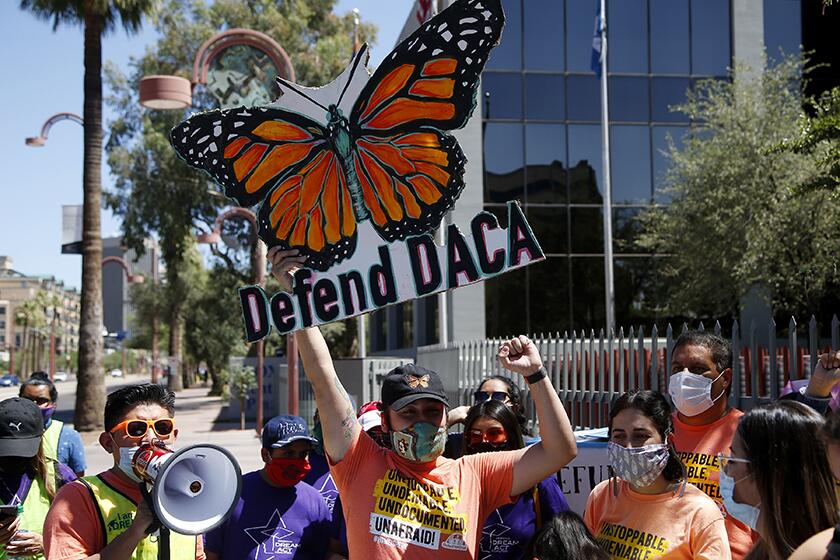Immigrants brought to the U.S. as children ask judges to keep protections against deportation

- Share via
NEW ORLEANS — Immigrants who grew up in the United States after being brought here illegally as children were among the nearly 200 demonstrators outside a federal courthouse in New Orleans on Thursday as three appellate judges heard arguments over the Biden administration’s policy shielding the young immigrants from deportation.
At stake in the long legal battle playing out in the 5th U.S. Circuit Court of Appeals is the future of about 535,000 people who have long-established lives in the U.S., even though they don’t hold citizenship or legal residency status and they could eventually be deported.
“I live here. I work here. I own a home here,” said Marea Rocha Carrillo, 37, who traveled from her home in New York to join the demonstration.
Carrillo said she was brought to the U.S. at age 3 when family members immigrated from Mexico, where she was born. She could not get a teaching certificate until the Deferred Action for Childhood Arrivals program allowed her to build a career in education.
Immigration is a top presidential election issue again in 2024, as Republican Donald Trump and Democrat Kamala Harris espouse starkly different approaches to managing the border.
Opponents of DACA weren’t in evidence among the demonstrators. But opponents, chiefly Texas and eight other Republican-dominated states, have said in court arguments and legal briefs that they incur hundreds of millions of dollars in healthcare, education and other costs when immigrants are allowed to remain in the country illegally.
The appeals court panel hearing the arguments won’t rule immediately. Whatever it decides, the case will almost certainly wind up before the U.S. Supreme Court.
Then-President Obama first put the Deferred Action for Childhood Arrivals program in place in 2012, citing inaction by Congress on legislation aimed at giving those brought to the U.S. as youngsters a path to legal status and citizenship. Years of litigation followed. President Biden renewed the program in hopes of winning court approval.
But in September 2023, U.S. District Judge Andrew Hanen in Houston said the executive branch had overstepped its authority.
Hanen barred the government from approving new applications, but left DACA intact for existing recipients, known as “Dreamers,” during appeals.
Defenders of the policy argue that Congress has given the executive branch’s Homeland Security Department authority to set immigration policy, and that the states challenging the program have no basis to sue.
DACA was always ‘a temporary stopgap measure,’ former President Obama once said. Now that it could end, beneficiaries are looking outside the U.S. to relocate.
“They cannot identify any harms flowing from DACA,” Nina Perales, vice president of the Mexican American Legal Defense and Education Fund, said at a news conference this week.
The Texas attorney general’s office did not respond to an emailed interview request. The other states challenging DACA are Alabama, Arkansas, Kansas, Louisiana, Mississippi, Nebraska, South Carolina and West Virginia.
The Immigration Reform Law Institute is among the allies of those states to file court briefs.
“Congress has repeatedly refused to legalize DACA recipients, and no administration can take that step in its place,” the group’s executive director, Dale L. Wilcox, said in a statement this year.
The panel hearing the case consists of judges Jerry Smith, nominated to the 5th Circuit by President Reagan; Edith Brown Clement, nominated by President George W. Bush; and Stephen Higginson, nominated by Obama.
McGill and Brook write for the Associated Press.
More to Read
Sign up for Essential California
The most important California stories and recommendations in your inbox every morning.
You may occasionally receive promotional content from the Los Angeles Times.












